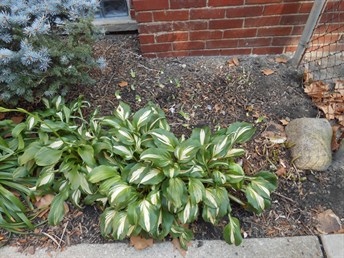3rd week of September:
I notice you've cut down irises already. Is that
okay?
- S.J. -
This article is also available in pdf
magazine format.
Download it: What's
Coming Up 203
Early cuts are ruthless, harmless, pretty
It's perfectly okay. Irises, peonies, coneflowers, daylilies,
we're cutting at will, now. Some for their health, most for our
visual pleasure.
Some perennials, including peonies and iris, are better cut
early than late. When we remove iris foliage from the bed after
early September, we're also fending off next year's pests by
removing iris borer eggs laid on those leaves. We cut peonies early
to stay ahead of botrytis, a leaf disfiguring, flower bud killing
disease. By October what were just purple-brown blotches on the
leaves and stalks at Labor Day may have traveled down the stem and
infected the crown, ready to start trouble in the new year.

Above: A peony and other plants have been cut out of this
garden long before frost. One reason we cut out the peony was to
control the very common disease, peony botrytis. We don't miss its
presence. Compare this image to the one at the top of this page to
make up your own mind.
Pest trouble aside, we don't cut gardens down all at once in
late fall. It's too depressing to go from merry fullness to
moonscape in one day. Instead, we cut a bit at a time throughout
fall. We're not out to scalp anything, just take away all the tall
stems and debris. Perennials that develop a basal rosette for
winter keep that nice looking new foliage. Others produce some new
growth after the cut, which is not a loss to the plant and can even
refresh a late fall scene.
We've been doing this ruthless cutting for 30 years without ill
effect, ever since it occurred to us that Ma Nature does the same
thing in our region when killing frost comes earlier than usual, in
September. That the plants survive this means they must be capable
of early check out. And why not? By Septemebr they've had a 5 month
growing season, and that's plenty.
Ma Nature's killing frosts can start cutting things down in
September in our region. So we have no qualms about cutting
early.
- Janet -
Below: If a perennial's no longer attractive in fall -- brown
or just blah -- we take it out of the picture. Since we no longer
admired this Russian sage (A, Perovskia atriplicifolia), we don't
miss it after the cut. (About "B" - we cut down those daylilies six
weeks ago when they were tatty and brown. We like them better with
new foliage.)


Below: Places like this bearded iris patch in the last half of
September are where Steven's photographer's motto applies
perfectly. "If it's not contributing to the scene, it must be
detracting."


Exceptions to the
early cut
We do make exceptions. We ask ourselves before the cut:
- Did we pick this plant and place it so its seedpods and stems
would make a nice winter scene?
- If we take this out will any still-blooming neighbor fall down
or look lonely? (There's no sense leaving fall stars prone or
forlorn. In the photo above we considered cutting out the hosta,
too, but the Nerine at far left has yet
to bloom and can stand the company.)
- Did we grow this for seeds for the birds? (If appearances
require we cut them, then we bunch the stems and hang them where
the birds can still get them.)
- Is this part of a butterfly sanctuary? The stalks all around
butterfly host plants may have overwintering caterpillars and
chrysalises. (If we must cut these, we bundle them loosely, prop
the sheaves out of sight, then clear them away late the next
spring.)
- Is this a marginally hardy plant, one to be babied? If so, it
may derive a bit of extra protection from its old stems. (However,
we've mostly given up that goofy game. Now, if it's not reliable
over winter we say, "to heck with you.")